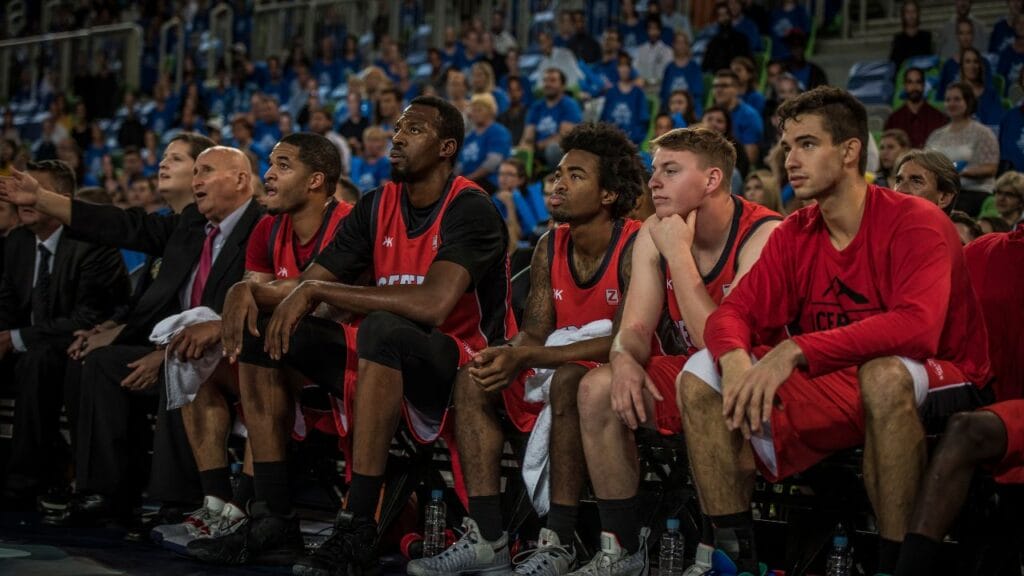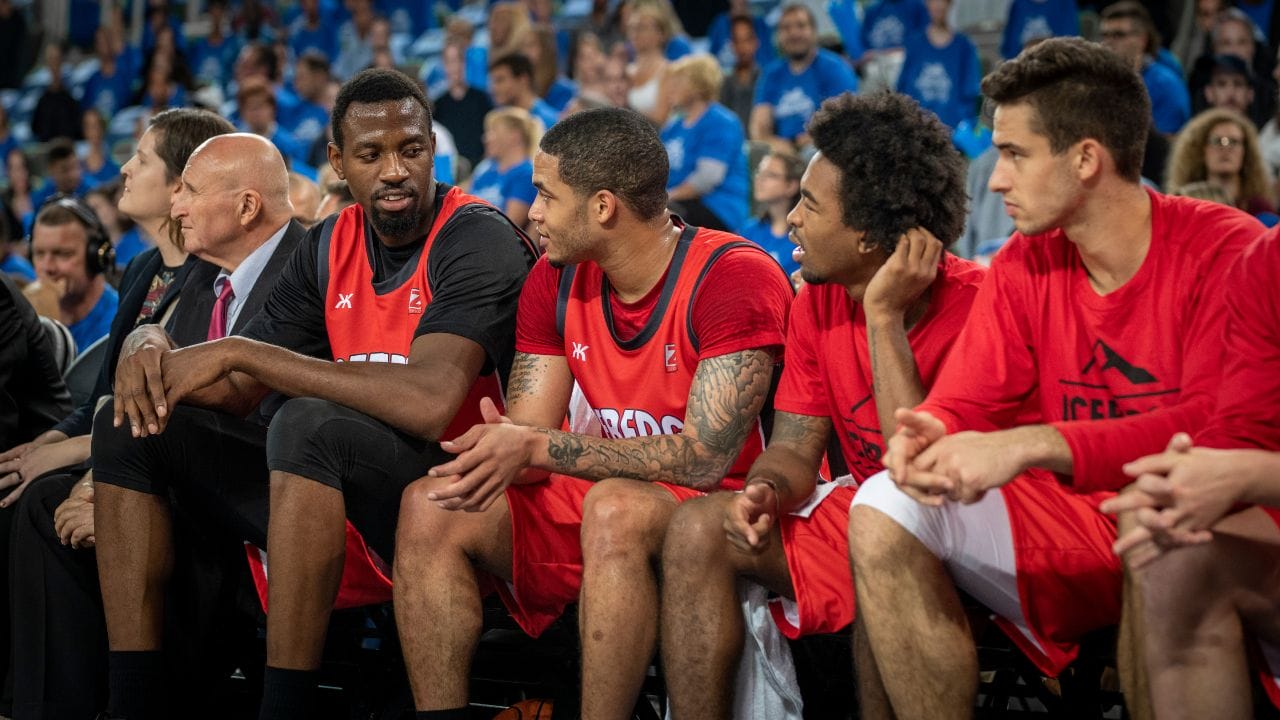When watching a game, have you ever come across the term “DNP”? DNP, which stands for “Did Not Play,” is a common abbreviation used in basketball to indicate that a player did not participate in a particular game.
The purpose of this article is to explain what DNP means in basketball and how it affects a player’s participation. No matter if you are a new fan or someone who wishes to gain a deeper understanding of the game.
A poor court surface can increase the risk of various injuries, including slips, falls, and joint sprains. By providing a safe and supportive playing surface, the likelihood of such injuries is significantly reduced. Check out VMKON Outdoor Basketball Court.
Read on to learn more about What Does DNP Mean in Basketball.
Definition of DNP in basketball
DNP” stands for “Did Not Play.” In basketball, it is used to indicate that a player was on the team’s roster for a particular game but did not actually participate in the game. There are various reasons why a player might receive a DNP designation, such as injury, coach’s decision, or other circumstances that prevent them from taking the court.
When you see “DNP” next to a player’s name in a box score or game recap, it means that they were present on the bench but did not get the opportunity to contribute on the court during that specific game.
It’s important to note that receiving a DNP doesn’t necessarily reflect negatively on a player. Coaches make strategic decisions based on various factors such as matchups, game flow, and player rotations. Sometimes, a DNP can be a result of the team’s overall game plan rather than an indication of a player’s performance or abilities.
Reasons for a Player Having a DNP in Basketball
Several reasons why DNP might happen, and it’s not always as straightforward as it seems. Let’s explore some of the common reasons why players receive a DNP in the world of basketball.


1. Injury or Illness
One of the most common reasons for a player to receive a DNP is due to injury or illness. Basketball is a physically demanding sport, and players often have to deal with various injuries or illnesses that can sideline them from playing in a game.
2. Coach’s Decision
Sometimes, a player may receive a DNP simply because it’s the coach’s decision. Coaches have to make tough choices when it comes to the lineup and playing time, and a players may find themselves on the bench for strategic or performance-related reasons.
3. Matchup Considerations
In certain games, the opposing team’s style of play or lineup may not be the best fit for a particular player. As a result, the coach may choose to give that player a DNP in favor of others who are better suited to the matchup.
4. Developmental Purposes
In some cases, a player may receive a DNP as part of their developmental process. Coaches and team management may decide that a player would benefit from additional practice or observation from the sidelines rather than playing in a particular game.
5. Roster Depth
Teams with deep rosters may have talented players who end up with a DNP simply because there are other players ahead of them in the rotation. This doesn’t necessarily reflect on the player’s abilities but rather the dynamics of the team’s lineup.
6. Rest and Recovery
With the grueling schedule of the NBA and other professional leagues, players often need rest to recover from the physical demands of the game. Coaches may strategically give players a DNP to ensure they are well-rested for upcoming games.
7. Team Dynamics
Sometimes, a player’s absence from a game could be related to internal team dynamics, chemistry, or disciplinary actions. These situations are often handled internally and may not always be publicly disclosed.
Understanding the reasons behind a player’s DNP can provide valuable insight into the dynamics of a basketball team and the sport as a whole. It’s important to remember that receiving a DNP doesn’t define a player’s abilities or value to the team. Basketball is a team sport, and decisions regarding playing time are often made with the best interests of the team in mind.
If you want the best basketball courts for your game, then click here and get your own desired courts.
Understanding the Box Score and DNP in Basketball
The box score is an essential tool for analyzing basketball games, providing a comprehensive statistical overview of individual and team performances. It includes valuable insights such as points scored, rebounds, assists, steals, blocks, and other relevant statistics.


However, the box score also plays a crucial role in highlighting a player’s availability and playing time, especially when a player does not participate in a game, indicated as a “Did Not Play” or DNP.
Decoding DNP in the Box Score
DNP is a common abbreviation found in the box score, indicating that a player did not have any playing time during the game. A player’s absence is usually listed next to his name or in a separate section.
This notation helps in tracking and documenting a player’s involvement throughout the season, shedding light on instances where they were unable to participate due to reasons such as injuries, the coach’s decision, or other circumstances.
Is DNP the same as being listed out?
In basketball, DNP and “being listed out” are indeed very similar but not identical. Here’s the breakdown:
DNP (Did Not Play):
- This simply means a player did not participate in a specific game.
- There’s no specific reason attributed, so it could be due to injury, coach’s decision, rest, suspension, etc.
- DNP appears in box scores and official statistics.
Listed Out:
- This typically indicates a player is officially inactive for a game due to a specific reason.
- This reason could be injury, suspension, personal leave, or coach’s decision.
- “Listed out” is more informal and might not be used in official statistics.
So, both terms imply a player’s absence from a game, but “listed out” usually conveys a specific reason for their absence, while DNP remains neutral.
Significance of DNP in the Box Score
The inclusion of DNP in the box score serves several purposes and carries significant weight for teams, coaches, analysts, and fans. It provides transparency regarding a player’s availability and playing time, offering insights into their overall contributions to the team.
Additionally, it helps in understanding the impact of player absences on game outcomes and team strategies. For coaches and analysts, it aids in making informed decisions regarding player rotations and game plans.
Moreover, for fans, it offers clarity on the reasons behind a player’s absence, fostering a deeper understanding of the dynamics within the team. In short, the box score, with its inclusion of DNP, not only provides statistical insights but also offers a comprehensive view of player availability and its impact on the game.
It is a valuable tool that contributes to the overall understanding and analysis of basketball games, enriching the experience for teams, coaches, analysts, and fans alike.
Conclusion
DNP in basketball stands for “Did Not Play.” It’s a term used to indicate that a player was present for the game but did not actually participate. This could be due to various reasons, such as injury, the coach’s decision, or other factors.
Understanding this term can help fans and enthusiasts follow the game more closely and appreciate the dynamics of team rosters and player participation.
Frequently Asked Questions
What is a DNP Player?
A DNP player, also known as a “Did Not Play” player, refers to an athlete who is on the team roster but does not participate in a particular game. This can happen due to various reasons, such as injury, the coach’s decision, or other circumstances. It’s a common term used in sports, especially in basketball and baseball.
What is a DNP CD in Basketball?
A DNP-CD in basketball stands for “Did Not Play – Coach’s Decision.” It means that a player was on the team’s roster for a game but did not actually get to play because the coach decided not to put them in.
Why Would a Player Receive a DNP in Basketball?
A player might receive a DNP for various reasons, such as injury, a coach’s decision, or as part of the team’s strategy for that particular game.









